Political slang in China is a dynamic, evolving form of language used to navigate the country’s complex political landscape. It often emerges in response to events, media influence, and cultural shifts, serving as a coded way to discuss sensitive topics. Understanding these terms is crucial for grasping the nuances of Chinese society and governance. Political slang reflects the creative yet cautious nature of public discourse, blending humor, critique, and indirect communication. It highlights the enduring influence of Marxist thought and the adaptive nature of language in a rapidly changing digital era.
1.1. Definition and Importance of Political Slang
Political slang in China refers to coded language used to discuss sensitive topics, often emerging from societal events, media influence, and cultural shifts. It serves as a tool for indirect communication, allowing individuals to critique or comment on politics without overt confrontation. This slang is essential for understanding China’s complex political landscape, as it reflects societal values, humor, and the creative ways people navigate censorship. By decoding these terms, one gains insight into public sentiment and the adaptive nature of language in a controlled environment. Political slang highlights the intersection of culture, governance, and everyday life, making it a vital lens for analyzing Chinese society and governance.
1.2. Historical Context of Political Language in China
China’s political language has deep historical roots, shaped by traditional culture and Marxist ideology. The use of coded terms and metaphors dates back to imperial times, reflecting the need for indirect communication in hierarchical societies. During the Maoist era, political rhetoric became formalized, emphasizing class struggle and revolutionary ideals. The opening of China to global influences and the rise of the internet accelerated the evolution of political slang. Today, this language blends traditional expressions with modern internet culture, creating a unique lexicon that reflects societal values and adaptive governance. Understanding this historical context is key to deciphering contemporary political slang and its role in Chinese society.
Historical Evolution of Political Slang
Political slang in China traces its roots to imperial times, evolving through dynasties and political shifts. Traditional expressions merged with modern internet culture, shaped by historical events and societal changes.
2.1. Early Examples of Political Slang in Chinese History
Political slang in China has deep historical roots, with early examples reflecting the societal values and political climate of imperial times. During the Qin and Han dynasties, slang often took the form of indirect critiques of rulers, using metaphors and euphemisms to avoid censorship. For instance, terms like “euphemisms for corruption” emerged, allowing citizens to discuss sensitive issues covertly. These early slang terms were rooted in Confucian ideals and the need for subtle communication under authoritarian rule. They laid the foundation for modern political slang, which continues to blend tradition with contemporary issues, serving as a bridge between past and present.
2.2. Role of Traditional Chinese Culture in Shaping Political Language
Traditional Chinese culture significantly influences the evolution of political slang, drawing from Confucianism, Taoism, and classical literature. Proverbs and idioms from ancient texts are often repurposed to critique governance subtly. For example, the concept of “harmony” from Confucian teachings is used to promote social stability, while Taoist ideas of balance inspire metaphors for political equilibrium. Classical literary references are employed to veil dissent, reflecting the cultural preference for indirect communication. This blending of traditional wisdom with modern politics creates a unique linguistic landscape, where historical values shape contemporary discourse, ensuring that political slang remains deeply rooted in China’s cultural heritage while addressing current issues creatively.
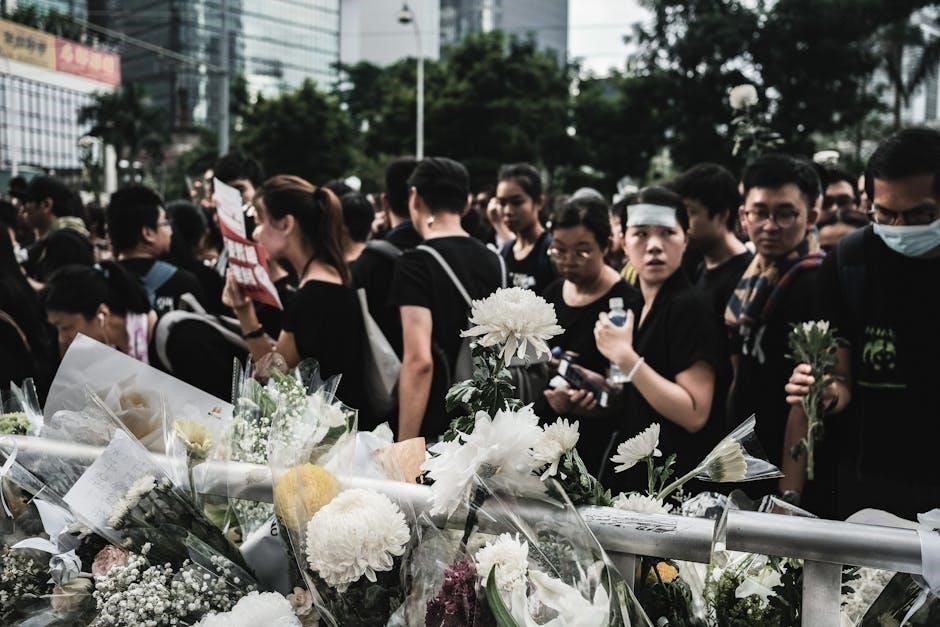
Key Themes and Motifs in Chinese Political Slang
Chinese political slang often revolves around governance, social control, and policy impact. Themes include leadership dynamics, censorship metaphors, and economic reforms, reflecting societal values and political realities.
3.1. Slang Related to Leadership and Governance
Political slang in China often centers on leadership, with terms like “Core Leader” and “Chairman Xi” symbolizing the central role of leaders in governance. These phrases reflect reverence and authority, while also subtly critiquing centralized power. Slang related to governance frequently emerges from official rhetoric, such as “Thought on Socialism with Chinese Characteristics,” which is often reinterpreted in informal contexts. Internet users creatively adapt these terms to discuss policies and leadership decisions, blending humor with critique. This linguistic adaptation highlights the dual nature of political discourse in China, where loyalty and dissent coexist in coded language.
3.2. Slang Reflecting Government Policies and Reforms
Chinese political slang often reflects government policies and reforms through creative, indirect language. Terms like “shuang kou zhao” (), referring to the Two-Session meetings, humorously critique political processes. Other slang, such as “xiaokang” (), originally meaning “moderately prosperous,” is reinterpreted to question the challenges of achieving this official goal. Online discourse frequently employs such terms to discuss the impact of policies, blending satire with societal commentary. These expressions reveal public sentiment toward reforms while navigating censorship. By reimagining official rhetoric, slang becomes a tool for public engagement and critique, offering insights into how citizens perceive and respond to government initiatives in contemporary China.
3.3. Slang Highlighting Social Control and Censorship
Chinese political slang often reflects themes of social control and censorship, offering subtle critiques of governmental oversight. Terms like “river crab” () symbolize censorship, referencing the wordplay between “harmony” and the crustacean. Similarly, “great firewall” () humorously describes China’s internet censorship system, which blocks foreign websites. These expressions highlight the constraints on free expression while using humor to navigate sensitive topics. Online discourse frequently employs such slang to discuss censorship without directly challenging authorities. By masking criticism in clever language, citizens creatively address issues of control, showcasing the resilience of public discourse in a tightly regulated environment.
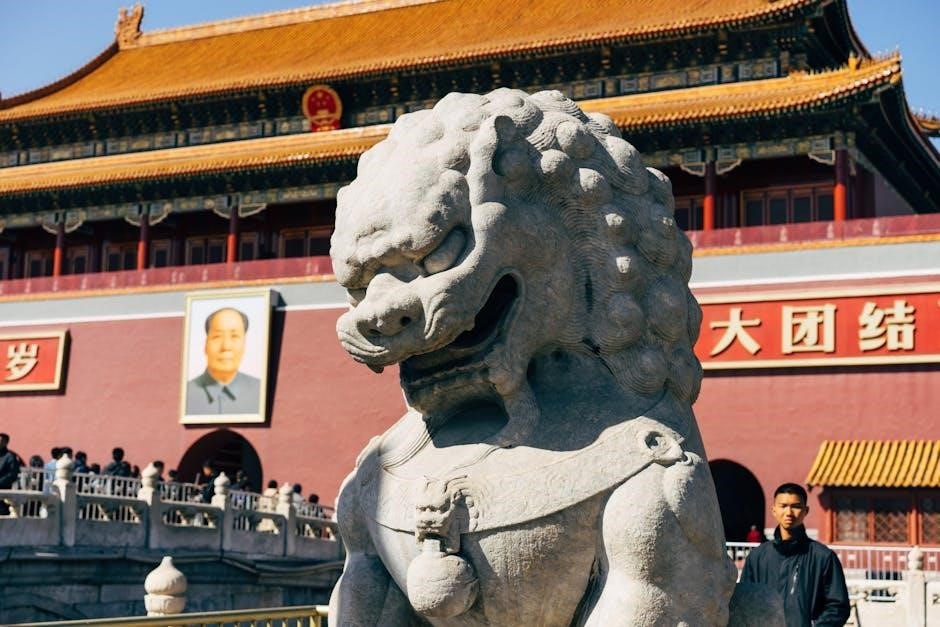
Important Terms in Chinese Political Slang
Key terms like “river crab” and “great firewall” symbolize censorship and internet control, reflecting China’s unique political climate. These phrases serve as coded language for sensitive issues.
4.1. “Imperial Capital” as a Metaphor for Beijing
The term “Imperial Capital” is a metaphor for Beijing, reflecting its historical and political significance. It evokes China’s imperial past, where Beijing was the center of power. Today, it symbolizes the city’s role as the nation’s political and cultural hub. Internet users often use this term to discuss sensitive topics indirectly, leveraging its historical connotations to critique modern governance. The metaphor highlights Beijing’s enduring influence and the centralized nature of Chinese politics. It is a subtle yet powerful example of how political slang blends history and contemporary issues, allowing for veiled commentary on the government and its policies.
4.2. “River Crab” and Its Significance in Online Discourse
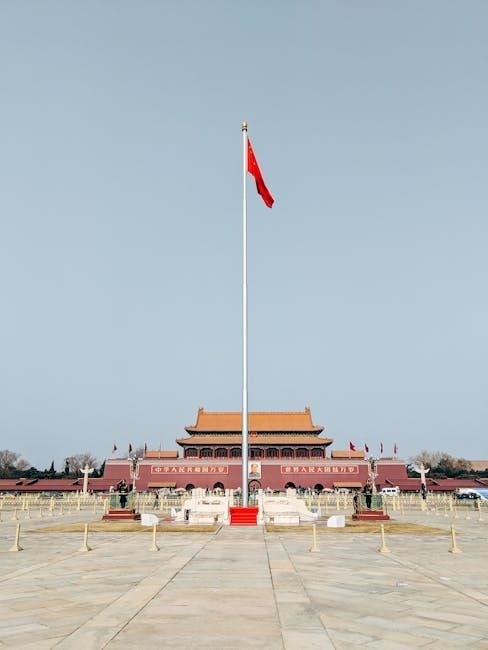
“River Crab” is a popular political slang term in China, derived from the word “harmony,” which is a cornerstone of government rhetoric. The term refers to the practice of internet censorship, where online content is frequently “harmonized” or removed. It symbolizes the tension between the government’s push for a controlled online environment and citizens’ desires for free expression. The crab metaphor, with its sideways movement, aptly represents the indirect and often humorous way users critique censorship. This term has become a powerful symbol in online discourse, reflecting both the creativity of netizens and the challenges of navigating China’s restrictive digital landscape.
4.3. “Harmony” as a Keyword in Political Rhetoric
“Harmony” is a central concept in Chinese political rhetoric, often invoked to promote social stability and unity. In official discourse, it emphasizes collective well-being and the suppression of dissent. However, the term has taken on a subversive edge in online slang, where it is frequently used ironically or critically. For instance, “harmonious society” can imply censorship or repression, reflecting a disconnect between government ideals and public experiences. This duality underscores the complex interplay between propaganda and public sentiment, making “harmony” a keyword that both reinforces and challenges the status quo in Chinese political culture and online communication.
4.4. “Great Firewall” and Internet Censorship
The “Great Firewall” is a term used to describe China’s extensive internet censorship system, which blocks access to foreign websites and monitors domestic online activity. This system, officially known as the Golden Shield Project, aims to control information flow and suppress dissent. In political slang, it symbolizes the government’s efforts to maintain ideological control and limit exposure to foreign influences. The term has become synonymous with the broader phenomenon of internet censorship in China, highlighting the tension between technological advancement and political control. It reflects the nation’s unique approach to managing cyberspace, blending technological prowess with strict regulation to shape public discourse and maintain social stability.
The Role of the Internet in Spreading Political Slang
The internet has revolutionized the dissemination of political slang in China, enabling rapid spread through social media, forums, and messaging apps. Online platforms foster creativity, anonymity, and widespread sharing, making them key spaces for political expression and satire. Homonyms and wordplay thrive in this digital environment, allowing users to critique or discuss sensitive topics covertly. This digital culture has transformed political slang into a powerful tool for public discourse, reflecting the dynamic interplay between technology and societal norms.
5.1. Social Media Platforms as Breeding Grounds for Slang
Social media platforms in China have become vibrant hubs for the creation and dissemination of political slang. Apps like WeChat and Weibo provide spaces where users can share and innovate language, often in response to current events or government policies. The anonymity these platforms offer encourages users to express opinions more freely, while the use of homonyms and wordplay helps evade censorship. This dynamic environment fosters a culture of creativity and satire, making social media a key driver of linguistic innovation in the realm of political discourse. The viral nature of these platforms ensures that slang spreads rapidly, shaping public sentiment and engagement.
5.2. The Use of Homonyms and Wordplay in Online Communication
Homonyns and wordplay are central to Chinese political slang, enabling users to convey politically sensitive ideas discreetly. By leveraging similar-sounding words or phrases, individuals can critique policies or leaders without directly referencing them. For instance, “river crab” (hexie) symbolizes internet censorship, while “harmony” (hexie) ironically refers to the government’s control. This linguistic creativity allows for veiled discussions, sidestepping strict censorship. The use of double meanings not only adds humor but also protects users from potential repercussions. Such wordplay reflects the ingenuity of online communication in China, where language becomes a tool for subtle resistance and social commentary, preserving free expression within constrained digital spaces.
5.3. Anonymity and its Impact on Political Slang Usage
Anonymity plays a pivotal role in the proliferation of political slang in China, offering users a shield to express opinions without repercussions. Online platforms, where identities can be obscured, foster the creation and dissemination of coded language. This veil of anonymity enables individuals to critique governance, policies, and societal issues more freely. Political slang thrives in these spaces, as users employ homonyms and wordplay to avoid censorship. Anonymity not only protects speakers but also amplifies the reach of such language, allowing it to resonate widely. However, the risk of being traced persists, creating a delicate balance between creative expression and caution in online discourse.

Implications of Political Slang for Domestic and International Audiences
Political slang in China holds significant implications for both domestic and international audiences. Domestically, it shapes public opinion and fosters a culture of subtle resistance. Internationally, it challenges translation accuracy and can lead to misinterpretation, affecting global perceptions of China’s political climate. The nuanced nature of slang often obscures its true meaning, complicating cross-cultural understanding. This duality underscores the importance of context in deciphering political slang, making it a double-edged tool in both local and global communication.
6.1. Challenges in Translating Political Slang
Translating Chinese political slang poses significant challenges due to its reliance on shared cultural knowledge and context. Many terms are rooted in wordplay, homonyms, or idiomatic expressions that do not directly translate. For instance, “river crab” (hexie) carries a specific connotation lost in English. Additionally, slang often evolves rapidly, making it difficult for translators to keep pace. The nuanced, indirect nature of political slang further complicates accurate interpretation. Misinterpretations can lead to misunderstandings of political intent or humor. These challenges highlight the importance of cultural context in translation and the limitations of conveying subtle meanings across languages. This affects both domestic and international communication.
6.2. Misinterpretation of Slang in International Contexts
The misinterpretation of Chinese political slang in international contexts often stems from cultural and linguistic barriers. Terms like “river crab” or “harmony” carry specific, context-dependent meanings that are easily lost in translation. International audiences may interpret these phrases literally, missing their satirical or metaphorical implications. For instance, “harmony” (hexie) is often used ironically to critique censorship, but this nuance is frequently overlooked. Such misinterpretations can lead to misunderstandings of China’s political climate and societal attitudes. The reliance on shared cultural knowledge further complicates international comprehension, highlighting the challenges of translating slang across linguistic and cultural divides. This can skew perceptions of Chinese politics globally.
6.3. The Role of Slang in Shaping Public Opinion
Political slang in China plays a significant role in shaping public opinion by providing a subtle yet powerful means of discourse. It often reflects societal attitudes toward governance, policies, and leadership, allowing citizens to express views indirectly. Slang terms like “river crab” and “harmony” become symbols of broader sentiments, fostering a sense of shared experience and humor. This linguistic creativity enables people to critique authority while avoiding direct confrontation. As slang spreads rapidly online, it influences perceptions and unites individuals in their interpretations of political events. However, the government’s awareness of slang’s impact has led to efforts to control its dissemination, further highlighting its significance in public discourse.
Regional Variations in Political Slang
Regional variations in Chinese political slang reflect local cultural nuances and dialects, with urban areas differing from rural regions. Ethnic minority languages also contribute unique expressions, while internet slang bridges gaps.
7.1. Differences Between Urban and Rural Slang Usage
Urban and rural areas in China exhibit distinct patterns in political slang usage, shaped by differing cultural contexts and access to information. Urban slang tends to be more sophisticated, often linked to current events, internet trends, and global influences, while rural slang remains rooted in traditional expressions and local folklore. Urban slang frequently incorporates wordplay and metaphors, reflecting the fast-paced, educated environment, whereas rural slang is more straightforward, often tied to agricultural life and community issues. The divide in internet access and education further amplifies these differences, with urban slang evolving rapidly and rural slang maintaining a slower, more conservative pace.
7.2. Slang in Ethnic Minority Languages and Regions
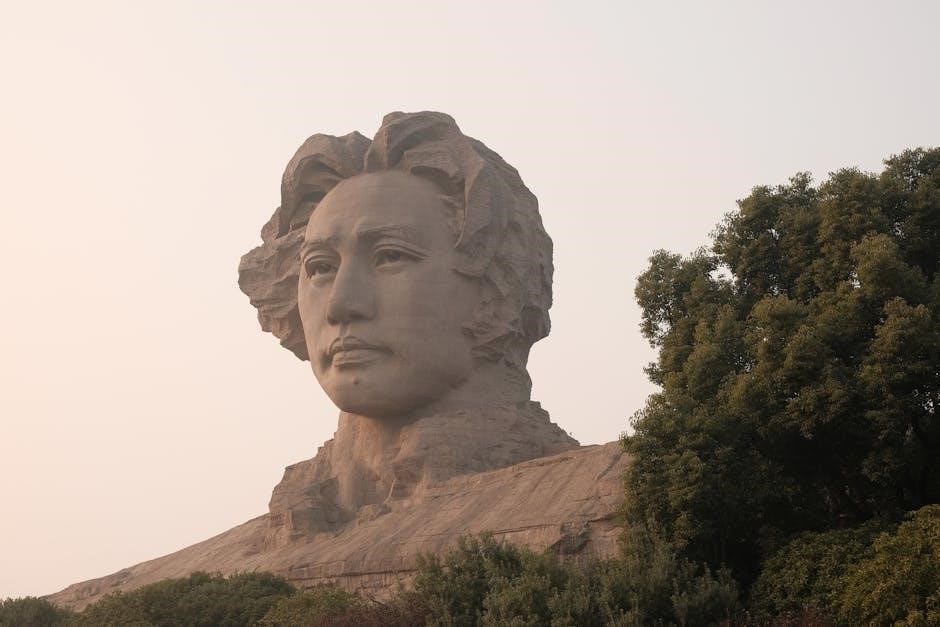
Slang in China’s ethnic minority regions reflects the rich linguistic and cultural diversity of the country. Ethnic minority languages often incorporate unique slang terms shaped by local customs, folklore, and historical experiences. For instance, in regions like Xinjiang or Tibet, slang may blend elements of Mandarin with indigenous languages, creating distinct dialects. These terms often carry cultural significance, expressing communal identity or humor specific to the region. However, the use of such slang can be limited to local contexts, making it less understood nationally. Additionally, the internet has played a role in spreading some regional slang, though its reach is often constrained by language barriers and regional isolation.
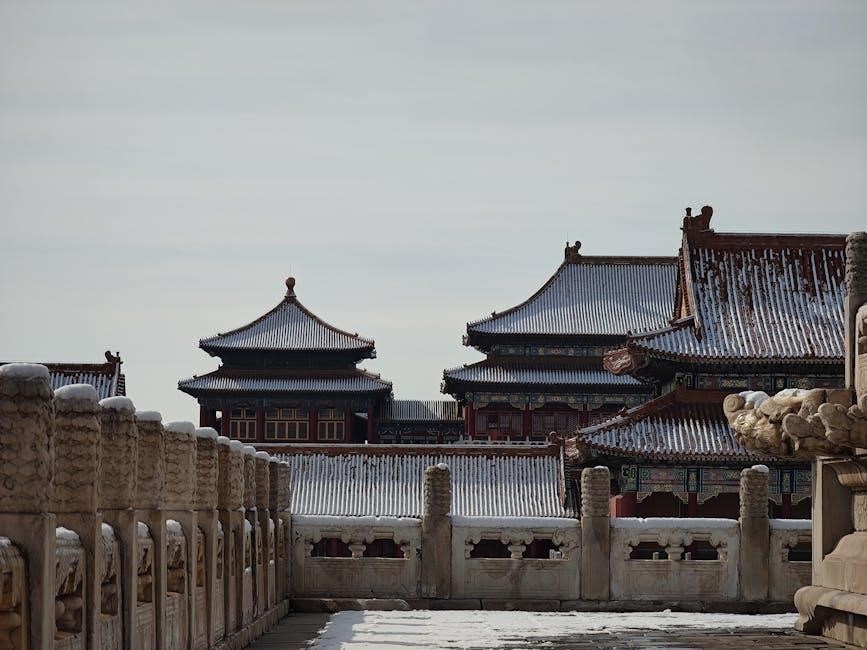
Cultural Significance of Political Slang
Political slang in China mirrors societal values and the adaptive nature of public discourse under censorship. It reflects creativity, humor, and indirect communication, serving as a tool for social commentary while navigating political sensitivities.
8.1. Political Slang as a Reflection of Societal Values
Political slang in China often mirrors the broader societal values and cultural norms, offering insights into public sentiment and the collective mindset. By examining these terms, one can identify themes such as resilience, adaptability, and the desire for stability. Slang frequently incorporates humor and satire, reflecting the population’s coping mechanisms with political and social challenges. It also highlights the tension between traditional values and modern influences, as well as the impact of censorship on communication. Through its evolution, political slang reveals how societal values in China are both preserved and transformed in response to changing circumstances and governance.
8.2. The Intersection of Humor and Politics in Slang
Humor plays a significant role in Chinese political slang, often serving as a subtle yet powerful tool for critique. Slang terms frequently incorporate wordplay, homonyms, and satire, allowing individuals to express opinions on sensitive topics without direct confrontation. This blending of humor and politics enables discussions about governance, censorship, and societal issues in a veiled yet relatable manner. For instance, terms like “river crab” and “harmony” carry layered meanings, poking fun at official discourse while avoiding overt defiance. Through humor, political slang provides a coping mechanism for navigating the complexities of China’s political landscape, fostering a sense of shared understanding among those “in the know.”
Political slang in China offers a unique lens into societal values, governance, and cultural adaptability. It reflects the creative, humorous, and often indirect nature of public discourse, shaping understanding of the nation’s evolving political landscape.
9.1. The Future of Political Slang in China
The future of political slang in China is likely to be shaped by technological advancements and evolving internet culture. Social media platforms will continue to serve as breeding grounds for new terms, leveraging homonyms and wordplay to evade censorship. As the government tightens internet control, slang may become even more coded and creative. The global influence of Chinese platforms like WeChat and Weibo could also spread these terms internationally, introducing them to new audiences. However, the dynamic nature of slang means it will remain a reflection of societal changes, adapting to shifting political landscapes and cultural norms. Its evolution will undoubtedly mirror the cat-and-mouse game between censorship and creativity;
9.2. Final Thoughts on the Role of Slang in Chinese Politics
Political slang plays a pivotal role in Chinese politics, serving as both a tool for expression and a means of critique. It reflects the societal values and tensions within the nation, offering insights into public sentiment. By using humor and indirect language, slang allows individuals to navigate censorship and discuss sensitive issues. Its prevalence highlights the resilience of free expression, even in a tightly controlled environment. As China continues to evolve, slang will remain a vital component of political discourse, shaping public opinion and providing a unique lens through which to understand the complexities of Chinese governance and culture.